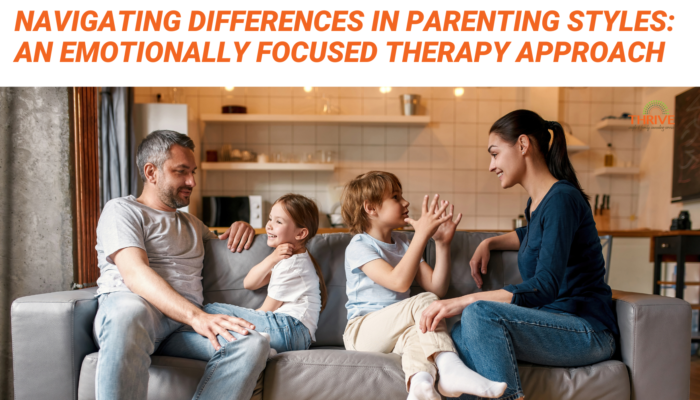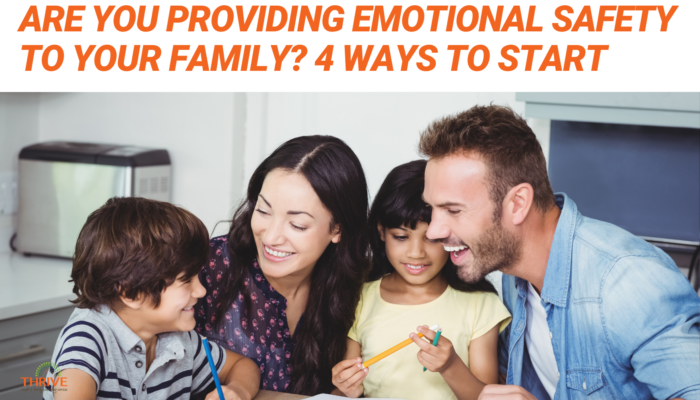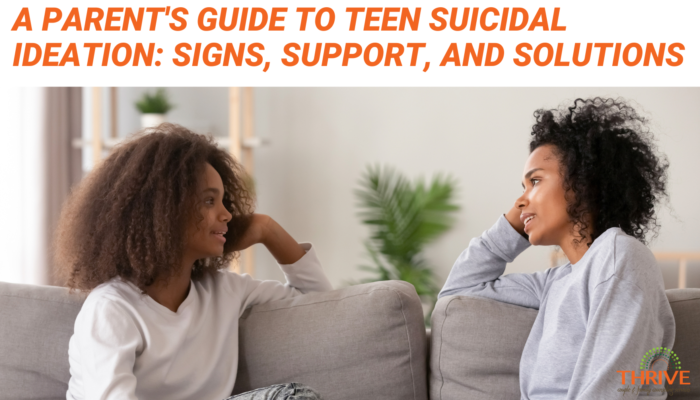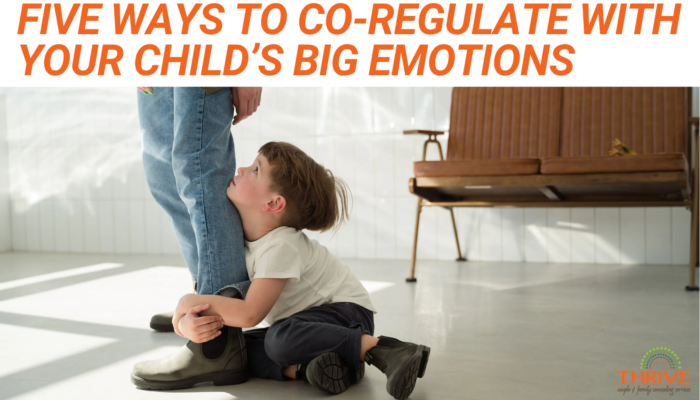I have a different approach to parenting than my partner. What can I do?
There’s a romanticized idea of parenthood where we assume it will automatically bring couples closer together, but in reality, many couples experience conflict around parenting.
So much of our parenting styles and habits are shaped by our experiences as a child, and naturally, those are always going to be different. As we develop our parenting style, most of us have a combination of conscious awareness and choice of how we want to do things, alongside more unconscious habits shaped by old memories and modeling.
While becoming a parent can certainly bring joy, pride, purpose, and increased connection with your partner, it can also be incredibly challenging due to these inherent differences. As all parents know, keeping a small human alive and raising them is hard work, and it’s some of the most important and humbling “work” we can ever do. Navigating parenting differences with your co-parent can add stress on top of that already stressful experience.
Discovering that you and your partner have different parenting styles can create tension and conflict in your relationship as you try to figure out the best path forward for your family. When you and your partner find yourselves in the same argument over and over, it’s a sure sign that you’re stuck in a negative cycle. As counselors who utilize Emotionally Focused Therapy (EFT) with our clients, we can help you uncover your negative cycle and deepen your connection with your partner.
What is a negative cycle?
In EFT, we recognize that most relationship conflict can be traced back to your negative cycle – a pattern of relating to one another that deepens disconnection and leads to conflict. Every couple has a negative cycle. Often, the arguments that couples have feel similar to one another, or take on the same pattern. This is especially true around parenting. You and your partner might have roles you typically take in disagreements around the relationships you have with your children.
Two of the classic roles we often see in negative cycles are the Pursuer and the Withdrawer. Pursuing partners seek more emotional connection, while Withdrawers avoid emotional connection. Both of these roles have the same goal (preserving the relationship), but they approach that goal in different ways. The tension caused by these different reactions can leave you stuck in your negative cycle.
The first step to changing your negative cycle is to be able to recognize when you’re stuck in it. It’s hard to do this, especially at first! Developing an awareness of when you’re sliding into your typical roles in a conflict can help you pump the brakes when you’re sliding into your negative cycle. Once you’ve learned to spot your negative cycle before you get stuck in it, you can explore the feelings that are underneath your reactions with more understanding and compassion toward yourself.
What does a negative cycle have to do with parenting?
Negative cycles are patterns of interaction where one partner’s behavior triggers a negative response in the other, creating a loop of escalating conflict. When parenting differences come into play, this cycle can become even more intense.
For example, one parent might believe in a strict approach to discipline, while the other tends towards a more lenient and nurturing style. These differing perspectives can lead to arguments and misunderstandings, where each partner feels unheard and unsupported.
In such situations, the strict parent might feel like they are constantly undermined or painted as “the bad guy,” while the nurturing parent feels like their efforts to foster a gentle environment are being criticized.
The transition to parenthood is complex and ongoing, and it’s impossible to get everything right as a parent. When there is a strong emotional reaction, it can be helpful to explore what’s going on underneath that reaction. Many of us have intense shame about struggling with parenting, and that sense of shame can drive the fears that perpetuate the negative cycle.
We all have fears for our children, fears of what others will think, and fears about our parenting itself. We also sometimes have beliefs and feelings of shame about our parenting, or trauma that continues to impact us. Often, these fears are behind our reactions that lead to our negative cycle.
When it comes to parenting, sometimes these fears come from feeling like you’re not a good enough parent, or that you’re going to traumatize your children in the same way you were traumatized as a child. Trying to understand what fears are underneath your parenting disagreements can help you understand more clearly where your partner is coming from and vice versa.
So, how can we feel more like a team when we disagree on parenting?
Rather than each parent feeling like they have to navigate these emotions alone, the EFT approach focuses on co-burdening and co-regulating as parents.
Co-burdening means sharing the weight of parenting challenges together, acknowledging each other’s fears and concerns, and providing mutual support. Co-regulating involves working together to manage emotional triggers and responses, helping each other stay calm and centered in the face of stress.
Remember, you and your partner are on the same team. Navigating different parenting styles is not about winning or losing; it’s about finding a way to parent together that respects both of your values and strengths. By co-burdening each other with your fears and concerns and co-regulating during times of stress, you can create a more harmonious and supportive parenting dynamic.
If you and your partner are struggling to reconcile differences in your parenting styles, your relationship is not doomed, and you’re not terrible parents.
There is no such thing as being a perfect parent. We all have ways of responding as parents that we don’t love, and later feel shame about. Often, these responses come from deep inside us, so we might not even understand why right away.
Learning to navigate differences in parenting styles takes time, curiosity, openness, and understanding. Here are some ways to start the process:
Explore your fears together
Underneath the negative cycle you experience you’ll often find fear. The fears and anxieties that we feel as parents can contribute to the way we prefer to parent our children. Understanding those fears that you both feel can help you see where your partner is coming from, and it can help them to see your side. Building up an awareness of the fear that you both feel can help you notice it more quickly, and get to the bottom of a conflict before it has a chance to even begin.
Practice communicating openly
If you have a concern about how your partner’s parenting is impacting your kids, can you talk about it? It might be hard to talk about this at first without triggering an emotional reaction, which is why it’s important to talk about this away from the kids. Regularly checking in with one another can help you stay on the same page and give you an opportunity to make decisions that work for the both of you. Make sure you pick a space where you both feel safe and comfortable, and do your best to withhold judgment, even when you disagree..
Share empathy and validate your partner’s feelings
Underneath the reactions and the decisions you make as parents is often a wounded inner child. You both will have your own set of traumas and fears that you bring to the table as parents. Finding a way to have empathy for these wounded parts of your partner can help you during moments of disagreement. Do your best to validate how they feel (and they should do the same for you). When it gets tricky to remain calm, remember that both of you have the same goal—a happy, healthy child.
Be flexible and willing to compromise
There are going to be things that you never agree on as parents, and that’s okay. Be willing to find a middle ground and make compromises when you can. Remember, parenting does not have a one-size-fits-all approach. Combining elements of both of your parenting styles can create a balanced and effective parenting strategy that you both feel comfortable with.
Become a resource for each other
When one of you is inevitably triggered as a parent, work on being a resource to each other. Offer emotional support when your partner is feeling overwhelmed or triggered. This can involve simple gestures like holding their hand, offering a kind word, or taking over a task to give them a break. If you have fears or concerns, share them with one another instead of keeping them to yourself. Rather than just one of you being burdened with whatever is going on, being a resource for each other allows you to share the parenting burden as a team.
Get help from a therapist
Navigating parenting differences and negative cycles are tricky, and sometimes you might need guidance. If navigating these differences feels overwhelming, seeking the help of a therapist who is trained in Emotionally Focused Therapy can make a huge difference. In fact, 70-75% of couples working with an EFT therapist go from distress to recovery! A therapist that specializes in couples therapy can help give you support as you find ways to make parenting work for your entire family.




